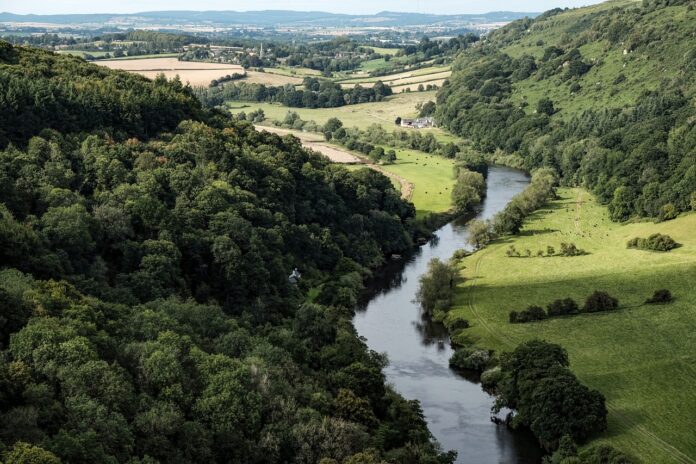River Action has been granted permission for judicial review of the Environment Agency’s alleged failure to protect the River Wye from pollution.
The High Court will examine the Environment Agency’s enforcement of regulations that govern the amount of organic manure and artificial fertiliser that can be spread on agricultural land from which water runs off and leaches into the River Wye.
Permission for judicial review was granted following a hearing at the High Court in Cardiff on Thursday 19 October 2023. The judicial review hearing is expected to take place during 2024.
It is argued that the Wye is heavily polluted because excessive amounts of animal manure are regularly spread across land within the river catchment, leading to a substantial increase in levels of phosphorus in the soil. This then runs off and leaches into the river, causing widespread algal blooms along the length of the river system, turning the water an opaque green.
Algal blooms block sunlight, remove oxygen and cause widespread algal deposits across the riverbed, with severe consequences for the vegetation and wildlife of the river.
A study by Lancaster University published in May 2022 found 60-70% of the river’s phosphorus now comes from agriculture – 3,000 tonnes of it are entering the river every year. There has been very rapid recent growth of the region’s intensive poultry industry.
The Wye was designated a Special Area of Conservation (SAC) to protect the river’s once-famous extensive Ranunculus river weed beds. However, according to River Action, over 90 per cent of the river’s Ranunculus have now been lost, smothered by algal blooms.
River Action says this could have been seriously mitigated had the EA enforced existing environmental regulations.
The environment campaign group was given permission to argue its case on all three of its grounds:
The Environment Agency has adopted an approach to enforcing the Farming Rules for Water (FRfW) that ultimately frustrates the purpose of the legislation it is supposed to enforce
By slavishly following guidance issued by the Environment Secretary the Environment Agency has put itself in a situation where it is acting unlawfully
The Environment Agency has breached regulation 9(3) of The Conservation of Habitats and Species Regulations 2017 in that its policy on enforcement of the FRfW unlawfully fails to follow the requirements of the Habitats Directive
River Action’s chairman and founder Charles Watson said:
“We are delighted that we have now finally been granted permission to go to court, where we will vigorously make the case that a prime cause for the recent ecological collapse of the River Wye is the EA’s decision to slavishly follow DEFRA’s guidance to not enforce critical provisions of the 2018 Farming Rules for Water. These critically important regulations state that fertilisers and manures must not be spread on soils already over-saturated with excess nutrients. Tragically, due to the uncontrolled growth of what we believe to be the largest concentration of intensive poultry production in Europe, this is exactly what has been allowed to happen, with the horrific environmental consequences for the River Wye being all too plain to see.”
River Action is represented by Leigh Day environment team solicitor Ricardo Gama, who added:
“The Farming Rules for Water were put in place in 2018 exactly to address the issue of agricultural pollution in rivers, but the rules are pointless unless they are actually applied. The guidelines which the Environmnent Agency had given to its field officers would encourage them not only not to enforce against breaches of the rules, but not even to tell land managers that they are in breach when they are. Our clients believe that this approach to the rules might make the situation worse not better by encouraging bad practices. They look forward to a full hearing of the issues in the High Court.”
Help keep news FREE for our readers
Supporting your local community newspaper/online news outlet is crucial now more than ever. If you believe in independent journalism, then consider making a valuable contribution by making a one-time or monthly donation. We operate in rural areas where providing unbiased news can be challenging. Read More About Supporting The West Wales Chronicle






















